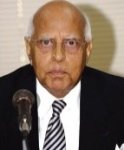Gen. Moeen U Ahmed's Visit to India: Timely and Significant
08 Mar, 2008 · 2509
Harun ur Rashid believes that the Bangladeshi Army Chief's visit to India marks a fresh and positive beginning in bilateral ties
The six-day visit of the Bangladesh Army Chief, Gen. Moeen U Ahmed to India from 25th February is significant in many ways, given the importance of bilateral relations between Bangladesh and India. The visit assumes added connotation at a time when a non-party caretaker government, headed by Dr. Fakruddin Ahmed, has been running the country since 12 January 2007. The caretaker government has no political ideology of its own and therefore, wants a trustworthy relationship with India, for mutual benefit.
India has accorded the visit the weight it deserves. The Indian media has also given importance to his visit, as all the major mainstream newspapers (The Hindu, The Statesman, Ananda Bazar Patrika and Assam Tribune) published news of his day-to-day programme.
All the talks between Gen. Moeen and India's political and military leaders have had one aim - to find specific ways to boost defence, transport and trade, among others, between the two neighbours.
The visit is timely because in the present day and age, the lines between external and internal threats have become blurred. Security problems do not arise from external factors alone. It is now generally accepted that security is multi-dimensional, and that in addition to military threats, the state's security can also be threatened by internal problems and terrorists acts.
It may be noted that during peace time, the purpose of deployment of armed forces has undergone a change from protecting people within the borders to addressing new security challenges. As a result the role of the armed forces has changed.
The armed forces are required to prevent, deter, and defend against the often elusive internal enemy. Some experts believe that the end purpose of military operations is not so much to seek victory as to integrate the former enemy into the community, by educating them to live normal lives.
Gen. Moeen had a hectic schedule in India. It is common protocol that when a top Army General or Admiral or Air Marshal visits another country, the distinguished visitor meets government leaders and in keeping with protocol, Gen. Moeen met India's key government leaders, including the President, Prime Minister, and External Affairs Minister.
Not only did Gen. Moeen meet his Indian counterpart, Gen. Deepak Kapoor, but he also held extensive meetings with India's Air and Navy Chiefs. Gen. Moeen reportedly said, "I propose to usher in a new era between the two Armies." At a spectacular function on 25 February, Gen. Kapoor presented the reins of four thoroughbreds to Gen. Moeen.
It has been reported that Gen. Moeen agreed for Bangladesh to finally honour the Indian Army soldiers who died in the Liberation war in 1971. The Eastern Corps Command is located in Fort William, Kolkata. That is why Gen. Moeen's visit to Kolkata was appropriate and important.
There is always an "India factor" in Bangladesh's foreign policy because the country is surrounded on the west, east, and north by India. Although its southern part opens into the Bay of Bengal, it still has to face a powerful Indian Navy on the seas.
Bangladesh-India relations are complex, sensitive, and multidimensional. Bilateral relations are the sum of the many ways individuals and institutions, public and private, manage relations between the two countries. There is no single model or form of bilateral relations because each nation sets its own priorities with neighbouring countries.
There are many bilateral issues pending between the two countries. They range from water sharing of common rivers, joint river management, agreement on storage or diversion of waters upstream of common rivers, demarcation of land border of 6.5kms in the east, exchange of enclaves in terms of the 1974 Mujib-Indira Boundary Agreement, and huge trade deficit against Bangladesh, to transit rights and sea boundary, including the disputed claims of Talpatty Island.
Given the above, both countries need to make sustained political, intellectual, bureaucratic, educational, cultural, and media efforts to understand each other better. Trust and confidence are the basis of a strong bilateral relationship.
In this context, analysts of both countries believe that Gen. Moeen's visit to India will pave the way for broader cooperation between the two countries for the benefit of the people on either side. Hopefully, it will open a new chapter of invigorated bilateral relationship on the basis of trust and confidence.


